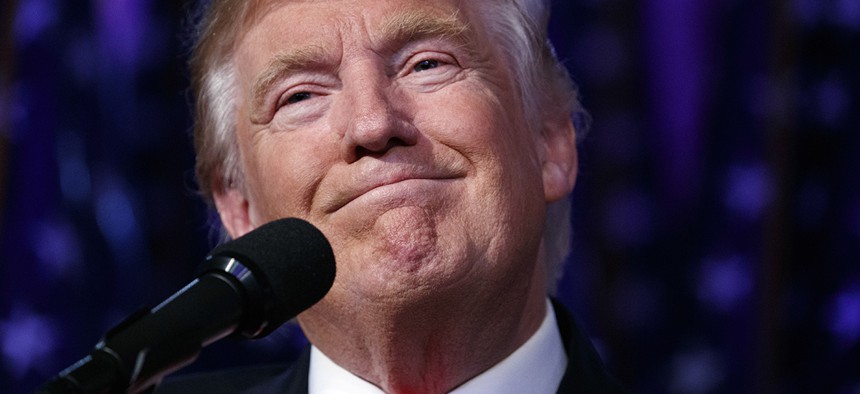Federal Tech Sector Reacts to President-Elect Trump

U.S. President-elect Donald Trump smiles as he arrives to speak at an election night rally, early Wednesday, Nov. 9, 2016, in New York. Evan Vucci/AP
A couple of federal tech groups are ready to get to work with the next commander-in-chief.
Two federal tech groups are ready to partner with President-elect Donald Trump to address the nation’s looming IT issues and cybersecurity concerns.
The Information Technology Industry Council, a Washington, D.C.-based tech advocacy group that represents dozens of tech companies, released a statement early Wednesday calling for a bipartisan approach to solving the government’s tech challenges.
“The enduring and exceptional principle of our democracy is the power of the people to speak their truth and directly shape the direction of the nation,” said ITI President and CEO Dean Garfield in a statement. “The tech sector is committed to working with President-elect Trump to help translate that truth into action that improves our lives and helps address some of society's most pressing problems. We stand ready to work with President-elect Trump and the new Congress to find the constructive, bipartisan approach to problem-solving that people want to see from their leaders."
» Get the best federal technology news and ideas delivered right to your inbox. Sign up here.
In the statement, Arlington, Virginia-based Professional Services Council, which represents more than 400 companies, said its members are ready to work with the new president, administration and lawmakers, "and our industry looks forward to continuing the successful partnership with our government in our joint desire to serve our country and its citizens."
PSC also offered a series of recommendations to the Trump administration, calling for increased partnership between contractors and government; bringing “experienced, competent leaders” into government; preserving continuity of successful programs and establishing a “working relationship with Congress.” PSC called on Trump to press Congress to enact an omnibus appropriations bill for fiscal 2017 and pass the National Defense Authorization Act and other important legislation.
On the campaign trail, Trump has mostly stayed mum on his tech policy positions. He has previously called for a shutdown of the internet to combat ISIS and said the United States is “obsolete” in cybersecurity. Trump—who doesn’t carry a cellphone or use email, according to various reports—has put forth a cybersecurity agenda to “crush” cyber criminals and ensure the U.S. government's “unquestioned” dominance in the worldwide digital domain. In many ways, Trump’s cyber agenda mirrors plans released by President Barack Obama, whose fiscal 2017 budget proposes $5 billion in additional cyber funding across the federal space.
Trump’s appointments to key positions amid the transition shuffle will offer clues to his early tech strategy, as will whether Trump and his cabinet members decide to continue or modify aspects of Obama’s tech agenda, including tech wings housed under the U.S. Digital Service and 18F.
When Congress returns for a lame-duck session next week, the Senate will have the opportunity to pass meaningful IT legislation. Industry groups and several federal chief information officers have suggested the Modernizing Government Technology Act of 2016, which passed the house unanimously in September, represents the best chance for agencies to address outdated hardware and software in their enterprises. A Capitol Hill source told Nextgov “it’s still too soon to know” how Trump’s election could impact the likelihood of the legislation passing.
From a federal spending perspective, Deltek’s five-year IT forecast, released over the summer, projected flat spending in IT through fiscal 2021, reaching approximately $98.3 billion annually. A new Deltek forecast, released Wednesday, calls for an increase in federal spending on cloud computing and big data through 2021.
Financially, the tech markets split following Trump’s election victory. Nextgov's sister publication Defense One reported earlier that defense contractors’ stock prices surged, while stocks for other Silicon Valley-based IT providers dropped. Lockheed Martin and Northrop Grumman were up about 5 percent each in the early afternoon while Amazon and Alphabet were down 2.8 and 0.5, respectively. In short, the early market reaction is keen for companies that have provided a slew of services to the military and less so for those that haven’t.
Another group of companies that could benefit from a Trump presidency are those dealing in space exploration, such as traditional contractors like Lockheed Martin and Boeing and newer competitors like SpaceX, Blue Origin, Orbital Tech and Bigelow Aerospace. In the past, Trump has vowed to expand NASA’s mission in space exploration, conceivably opening up more government dollars to an increasingly competitive market.
NEXT STORY: Transition moves into high gear



